Business Environment Analysis of TUI Group: Case Study Report
VerifiedAdded on 2023/06/10
|11
|3628
|310
Case Study
AI Summary
This case study report analyzes the business environment of TUI Group from 2019 to 2022, examining the impacts of the COVID-19 pandemic and the UK government's recovery plan. The report delves into the internal and micro environments of TUI, assessing how the pandemic affected operations, employee relations, and customer relationships. It explores the UK government's initiatives to support the tourism industry, including tax reductions and policy changes, and their effects on TUI's performance. Furthermore, the study investigates the influence of STEEPLE factors (Social, Technological, Economic, Environmental, Political, Legal, and Ethical) on TUI's operations, providing a comprehensive understanding of the external factors that shaped the company's strategies and outcomes during this challenging period. The analysis draws upon TUI Group's annual reports and other relevant sources to provide a detailed and insightful overview of the company's adaptation to the changing business environment.
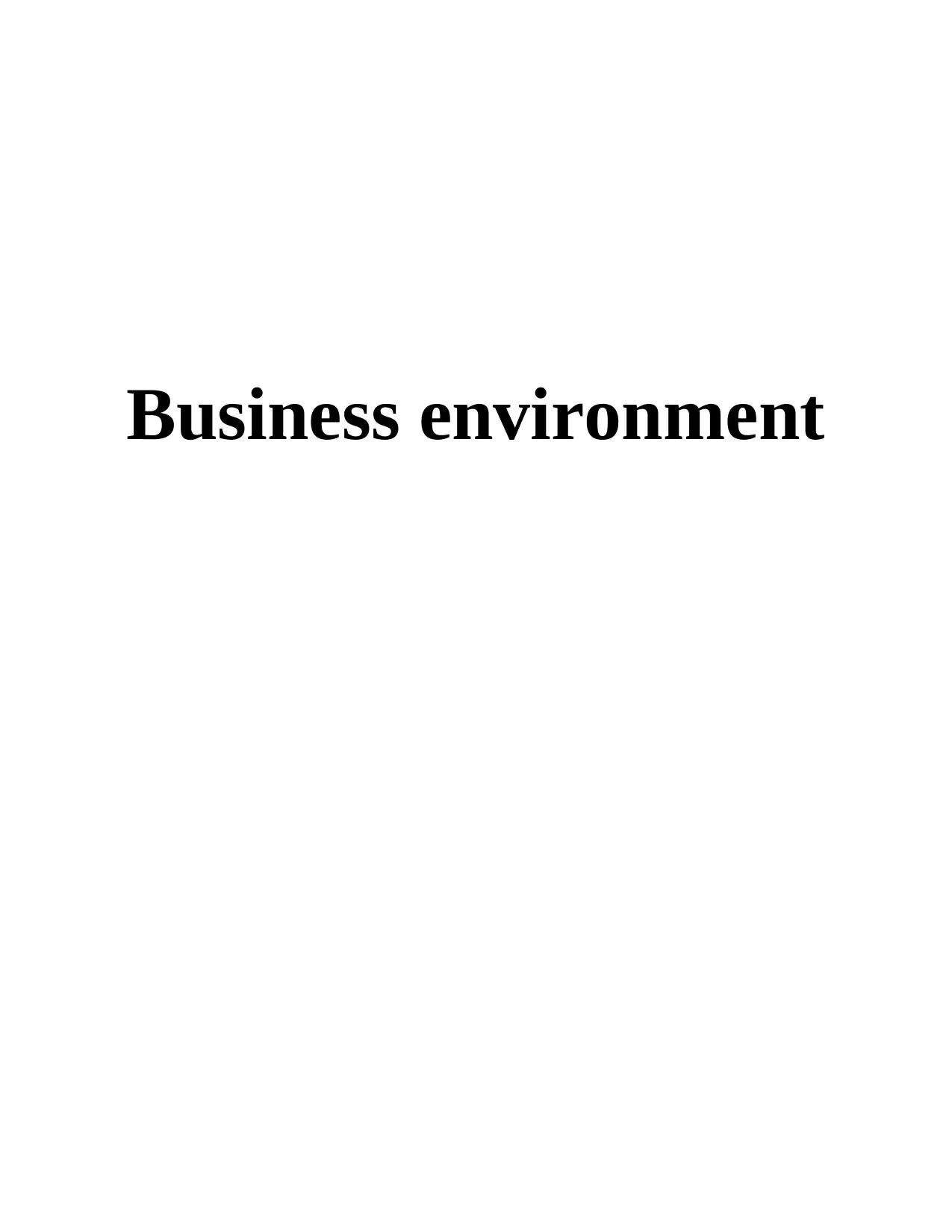
Business environment
Paraphrase This Document
Need a fresh take? Get an instant paraphrase of this document with our AI Paraphraser
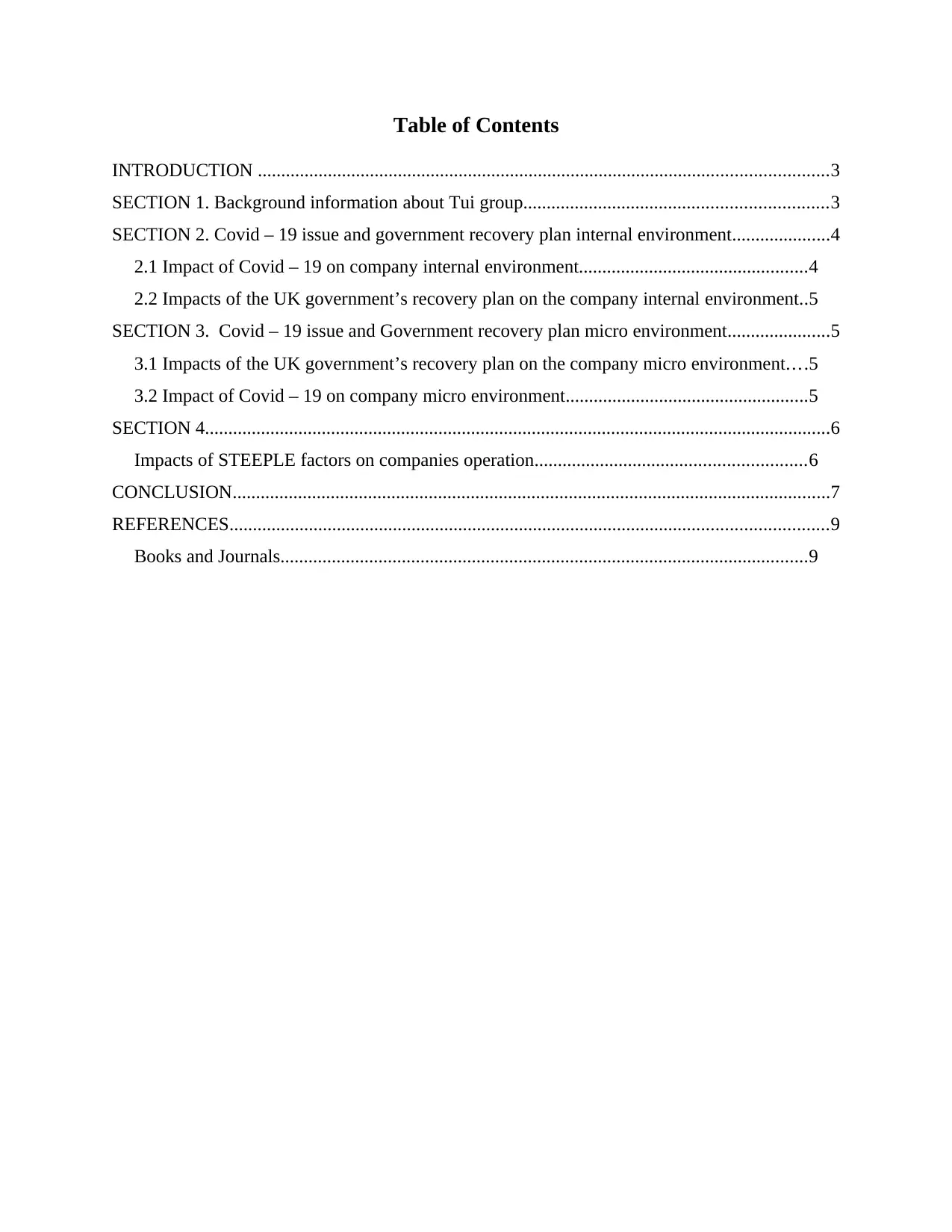
Table of Contents
INTRODUCTION ..........................................................................................................................3
SECTION 1. Background information about Tui group.................................................................3
SECTION 2. Covid – 19 issue and government recovery plan internal environment.....................4
2.1 Impact of Covid – 19 on company internal environment.................................................4
2.2 Impacts of the UK government’s recovery plan on the company internal environment..5
SECTION 3. Covid – 19 issue and Government recovery plan micro environment......................5
3.1 Impacts of the UK government’s recovery plan on the company micro environment....5
3.2 Impact of Covid – 19 on company micro environment....................................................5
SECTION 4......................................................................................................................................6
Impacts of STEEPLE factors on companies operation..........................................................6
CONCLUSION................................................................................................................................7
REFERENCES................................................................................................................................9
Books and Journals.................................................................................................................9
INTRODUCTION ..........................................................................................................................3
SECTION 1. Background information about Tui group.................................................................3
SECTION 2. Covid – 19 issue and government recovery plan internal environment.....................4
2.1 Impact of Covid – 19 on company internal environment.................................................4
2.2 Impacts of the UK government’s recovery plan on the company internal environment..5
SECTION 3. Covid – 19 issue and Government recovery plan micro environment......................5
3.1 Impacts of the UK government’s recovery plan on the company micro environment....5
3.2 Impact of Covid – 19 on company micro environment....................................................5
SECTION 4......................................................................................................................................6
Impacts of STEEPLE factors on companies operation..........................................................6
CONCLUSION................................................................................................................................7
REFERENCES................................................................................................................................9
Books and Journals.................................................................................................................9
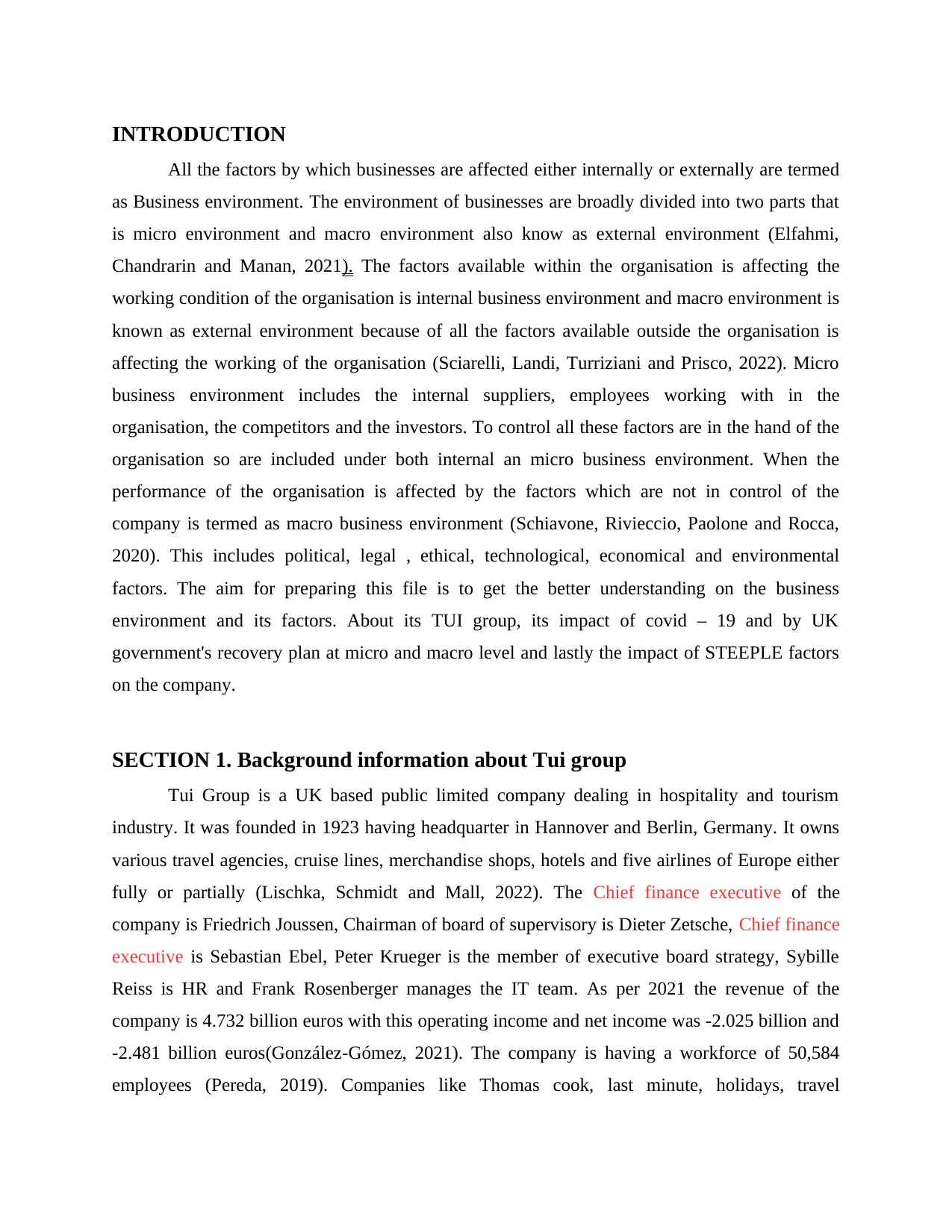
INTRODUCTION
All the factors by which businesses are affected either internally or externally are termed
as Business environment. The environment of businesses are broadly divided into two parts that
is micro environment and macro environment also know as external environment (Elfahmi,
Chandrarin and Manan, 2021). The factors available within the organisation is affecting the
working condition of the organisation is internal business environment and macro environment is
known as external environment because of all the factors available outside the organisation is
affecting the working of the organisation (Sciarelli, Landi, Turriziani and Prisco, 2022). Micro
business environment includes the internal suppliers, employees working with in the
organisation, the competitors and the investors. To control all these factors are in the hand of the
organisation so are included under both internal an micro business environment. When the
performance of the organisation is affected by the factors which are not in control of the
company is termed as macro business environment (Schiavone, Rivieccio, Paolone and Rocca,
2020). This includes political, legal , ethical, technological, economical and environmental
factors. The aim for preparing this file is to get the better understanding on the business
environment and its factors. About its TUI group, its impact of covid – 19 and by UK
government's recovery plan at micro and macro level and lastly the impact of STEEPLE factors
on the company.
SECTION 1. Background information about Tui group
Tui Group is a UK based public limited company dealing in hospitality and tourism
industry. It was founded in 1923 having headquarter in Hannover and Berlin, Germany. It owns
various travel agencies, cruise lines, merchandise shops, hotels and five airlines of Europe either
fully or partially (Lischka, Schmidt and Mall, 2022). The Chief finance executive of the
company is Friedrich Joussen, Chairman of board of supervisory is Dieter Zetsche, Chief finance
executive is Sebastian Ebel, Peter Krueger is the member of executive board strategy, Sybille
Reiss is HR and Frank Rosenberger manages the IT team. As per 2021 the revenue of the
company is 4.732 billion euros with this operating income and net income was -2.025 billion and
-2.481 billion euros(González-Gómez, 2021). The company is having a workforce of 50,584
employees (Pereda, 2019). Companies like Thomas cook, last minute, holidays, travel
All the factors by which businesses are affected either internally or externally are termed
as Business environment. The environment of businesses are broadly divided into two parts that
is micro environment and macro environment also know as external environment (Elfahmi,
Chandrarin and Manan, 2021). The factors available within the organisation is affecting the
working condition of the organisation is internal business environment and macro environment is
known as external environment because of all the factors available outside the organisation is
affecting the working of the organisation (Sciarelli, Landi, Turriziani and Prisco, 2022). Micro
business environment includes the internal suppliers, employees working with in the
organisation, the competitors and the investors. To control all these factors are in the hand of the
organisation so are included under both internal an micro business environment. When the
performance of the organisation is affected by the factors which are not in control of the
company is termed as macro business environment (Schiavone, Rivieccio, Paolone and Rocca,
2020). This includes political, legal , ethical, technological, economical and environmental
factors. The aim for preparing this file is to get the better understanding on the business
environment and its factors. About its TUI group, its impact of covid – 19 and by UK
government's recovery plan at micro and macro level and lastly the impact of STEEPLE factors
on the company.
SECTION 1. Background information about Tui group
Tui Group is a UK based public limited company dealing in hospitality and tourism
industry. It was founded in 1923 having headquarter in Hannover and Berlin, Germany. It owns
various travel agencies, cruise lines, merchandise shops, hotels and five airlines of Europe either
fully or partially (Lischka, Schmidt and Mall, 2022). The Chief finance executive of the
company is Friedrich Joussen, Chairman of board of supervisory is Dieter Zetsche, Chief finance
executive is Sebastian Ebel, Peter Krueger is the member of executive board strategy, Sybille
Reiss is HR and Frank Rosenberger manages the IT team. As per 2021 the revenue of the
company is 4.732 billion euros with this operating income and net income was -2.025 billion and
-2.481 billion euros(González-Gómez, 2021). The company is having a workforce of 50,584
employees (Pereda, 2019). Companies like Thomas cook, last minute, holidays, travel
⊘ This is a preview!⊘
Do you want full access?
Subscribe today to unlock all pages.

Trusted by 1+ million students worldwide
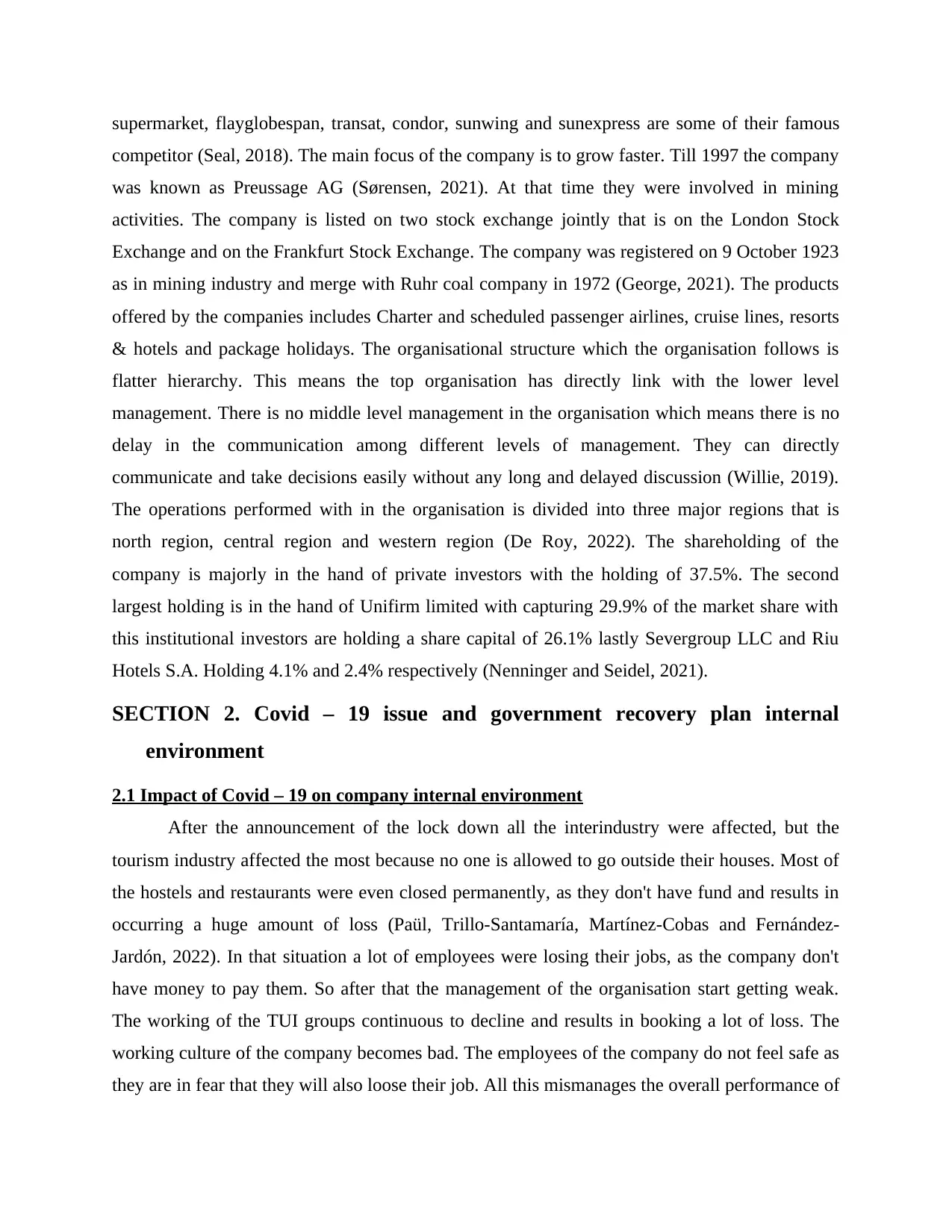
supermarket, flayglobespan, transat, condor, sunwing and sunexpress are some of their famous
competitor (Seal, 2018). The main focus of the company is to grow faster. Till 1997 the company
was known as Preussage AG (Sørensen, 2021). At that time they were involved in mining
activities. The company is listed on two stock exchange jointly that is on the London Stock
Exchange and on the Frankfurt Stock Exchange. The company was registered on 9 October 1923
as in mining industry and merge with Ruhr coal company in 1972 (George, 2021). The products
offered by the companies includes Charter and scheduled passenger airlines, cruise lines, resorts
& hotels and package holidays. The organisational structure which the organisation follows is
flatter hierarchy. This means the top organisation has directly link with the lower level
management. There is no middle level management in the organisation which means there is no
delay in the communication among different levels of management. They can directly
communicate and take decisions easily without any long and delayed discussion (Willie, 2019).
The operations performed with in the organisation is divided into three major regions that is
north region, central region and western region (De Roy, 2022). The shareholding of the
company is majorly in the hand of private investors with the holding of 37.5%. The second
largest holding is in the hand of Unifirm limited with capturing 29.9% of the market share with
this institutional investors are holding a share capital of 26.1% lastly Severgroup LLC and Riu
Hotels S.A. Holding 4.1% and 2.4% respectively (Nenninger and Seidel, 2021).
SECTION 2. Covid – 19 issue and government recovery plan internal
environment
2.1 Impact of Covid – 19 on company internal environment
After the announcement of the lock down all the interindustry were affected, but the
tourism industry affected the most because no one is allowed to go outside their houses. Most of
the hostels and restaurants were even closed permanently, as they don't have fund and results in
occurring a huge amount of loss (Paül, Trillo-Santamaría, Martínez-Cobas and Fernández-
Jardón, 2022). In that situation a lot of employees were losing their jobs, as the company don't
have money to pay them. So after that the management of the organisation start getting weak.
The working of the TUI groups continuous to decline and results in booking a lot of loss. The
working culture of the company becomes bad. The employees of the company do not feel safe as
they are in fear that they will also loose their job. All this mismanages the overall performance of
competitor (Seal, 2018). The main focus of the company is to grow faster. Till 1997 the company
was known as Preussage AG (Sørensen, 2021). At that time they were involved in mining
activities. The company is listed on two stock exchange jointly that is on the London Stock
Exchange and on the Frankfurt Stock Exchange. The company was registered on 9 October 1923
as in mining industry and merge with Ruhr coal company in 1972 (George, 2021). The products
offered by the companies includes Charter and scheduled passenger airlines, cruise lines, resorts
& hotels and package holidays. The organisational structure which the organisation follows is
flatter hierarchy. This means the top organisation has directly link with the lower level
management. There is no middle level management in the organisation which means there is no
delay in the communication among different levels of management. They can directly
communicate and take decisions easily without any long and delayed discussion (Willie, 2019).
The operations performed with in the organisation is divided into three major regions that is
north region, central region and western region (De Roy, 2022). The shareholding of the
company is majorly in the hand of private investors with the holding of 37.5%. The second
largest holding is in the hand of Unifirm limited with capturing 29.9% of the market share with
this institutional investors are holding a share capital of 26.1% lastly Severgroup LLC and Riu
Hotels S.A. Holding 4.1% and 2.4% respectively (Nenninger and Seidel, 2021).
SECTION 2. Covid – 19 issue and government recovery plan internal
environment
2.1 Impact of Covid – 19 on company internal environment
After the announcement of the lock down all the interindustry were affected, but the
tourism industry affected the most because no one is allowed to go outside their houses. Most of
the hostels and restaurants were even closed permanently, as they don't have fund and results in
occurring a huge amount of loss (Paül, Trillo-Santamaría, Martínez-Cobas and Fernández-
Jardón, 2022). In that situation a lot of employees were losing their jobs, as the company don't
have money to pay them. So after that the management of the organisation start getting weak.
The working of the TUI groups continuous to decline and results in booking a lot of loss. The
working culture of the company becomes bad. The employees of the company do not feel safe as
they are in fear that they will also loose their job. All this mismanages the overall performance of
Paraphrase This Document
Need a fresh take? Get an instant paraphrase of this document with our AI Paraphraser
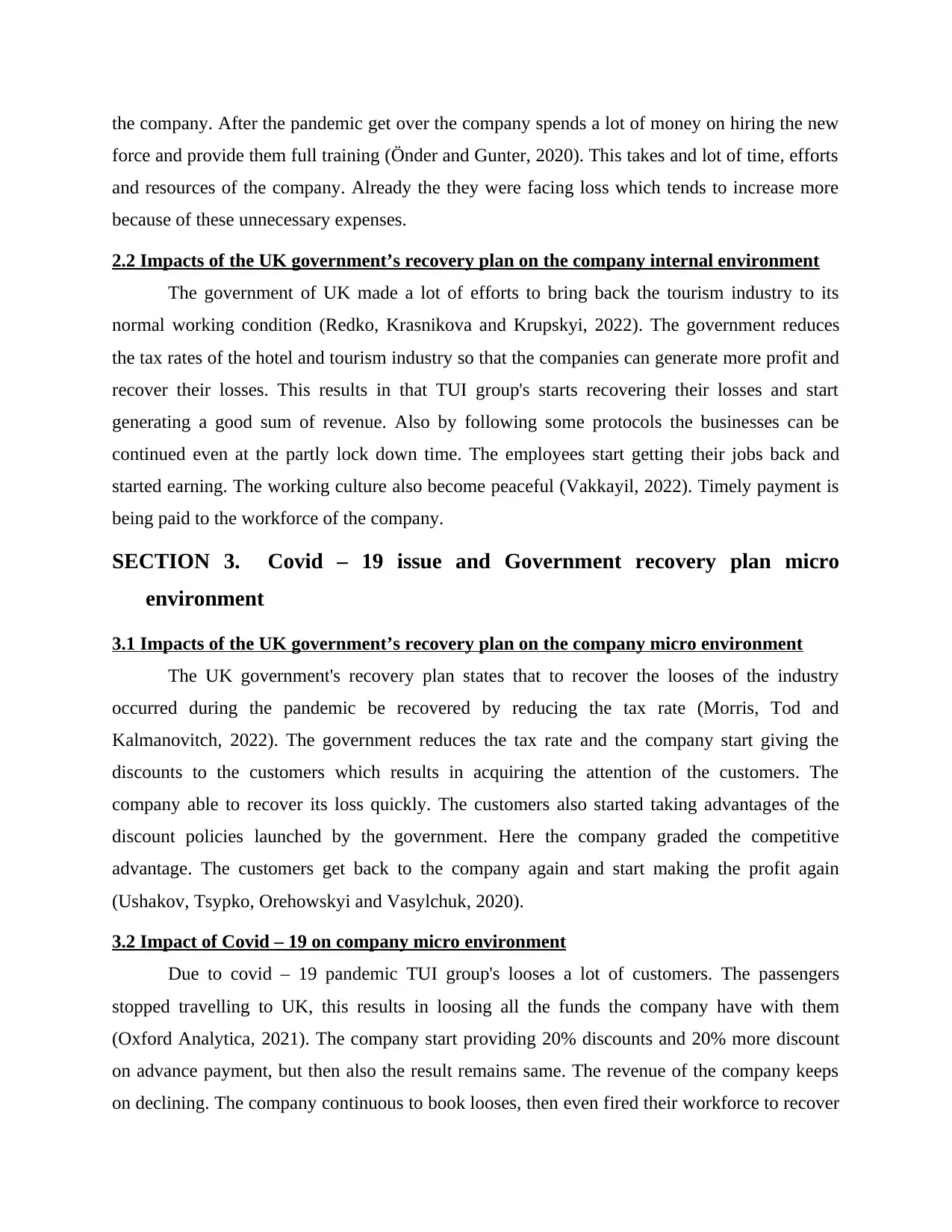
the company. After the pandemic get over the company spends a lot of money on hiring the new
force and provide them full training (Önder and Gunter, 2020). This takes and lot of time, efforts
and resources of the company. Already the they were facing loss which tends to increase more
because of these unnecessary expenses.
2.2 Impacts of the UK government’s recovery plan on the company internal environment
The government of UK made a lot of efforts to bring back the tourism industry to its
normal working condition (Redko, Krasnikova and Krupskyi, 2022). The government reduces
the tax rates of the hotel and tourism industry so that the companies can generate more profit and
recover their losses. This results in that TUI group's starts recovering their losses and start
generating a good sum of revenue. Also by following some protocols the businesses can be
continued even at the partly lock down time. The employees start getting their jobs back and
started earning. The working culture also become peaceful (Vakkayil, 2022). Timely payment is
being paid to the workforce of the company.
SECTION 3. Covid – 19 issue and Government recovery plan micro
environment
3.1 Impacts of the UK government’s recovery plan on the company micro environment
The UK government's recovery plan states that to recover the looses of the industry
occurred during the pandemic be recovered by reducing the tax rate (Morris, Tod and
Kalmanovitch, 2022). The government reduces the tax rate and the company start giving the
discounts to the customers which results in acquiring the attention of the customers. The
company able to recover its loss quickly. The customers also started taking advantages of the
discount policies launched by the government. Here the company graded the competitive
advantage. The customers get back to the company again and start making the profit again
(Ushakov, Tsypko, Orehowskyi and Vasylchuk, 2020).
3.2 Impact of Covid – 19 on company micro environment
Due to covid – 19 pandemic TUI group's looses a lot of customers. The passengers
stopped travelling to UK, this results in loosing all the funds the company have with them
(Oxford Analytica, 2021). The company start providing 20% discounts and 20% more discount
on advance payment, but then also the result remains same. The revenue of the company keeps
on declining. The company continuous to book looses, then even fired their workforce to recover
force and provide them full training (Önder and Gunter, 2020). This takes and lot of time, efforts
and resources of the company. Already the they were facing loss which tends to increase more
because of these unnecessary expenses.
2.2 Impacts of the UK government’s recovery plan on the company internal environment
The government of UK made a lot of efforts to bring back the tourism industry to its
normal working condition (Redko, Krasnikova and Krupskyi, 2022). The government reduces
the tax rates of the hotel and tourism industry so that the companies can generate more profit and
recover their losses. This results in that TUI group's starts recovering their losses and start
generating a good sum of revenue. Also by following some protocols the businesses can be
continued even at the partly lock down time. The employees start getting their jobs back and
started earning. The working culture also become peaceful (Vakkayil, 2022). Timely payment is
being paid to the workforce of the company.
SECTION 3. Covid – 19 issue and Government recovery plan micro
environment
3.1 Impacts of the UK government’s recovery plan on the company micro environment
The UK government's recovery plan states that to recover the looses of the industry
occurred during the pandemic be recovered by reducing the tax rate (Morris, Tod and
Kalmanovitch, 2022). The government reduces the tax rate and the company start giving the
discounts to the customers which results in acquiring the attention of the customers. The
company able to recover its loss quickly. The customers also started taking advantages of the
discount policies launched by the government. Here the company graded the competitive
advantage. The customers get back to the company again and start making the profit again
(Ushakov, Tsypko, Orehowskyi and Vasylchuk, 2020).
3.2 Impact of Covid – 19 on company micro environment
Due to covid – 19 pandemic TUI group's looses a lot of customers. The passengers
stopped travelling to UK, this results in loosing all the funds the company have with them
(Oxford Analytica, 2021). The company start providing 20% discounts and 20% more discount
on advance payment, but then also the result remains same. The revenue of the company keeps
on declining. The company continuous to book looses, then even fired their workforce to recover
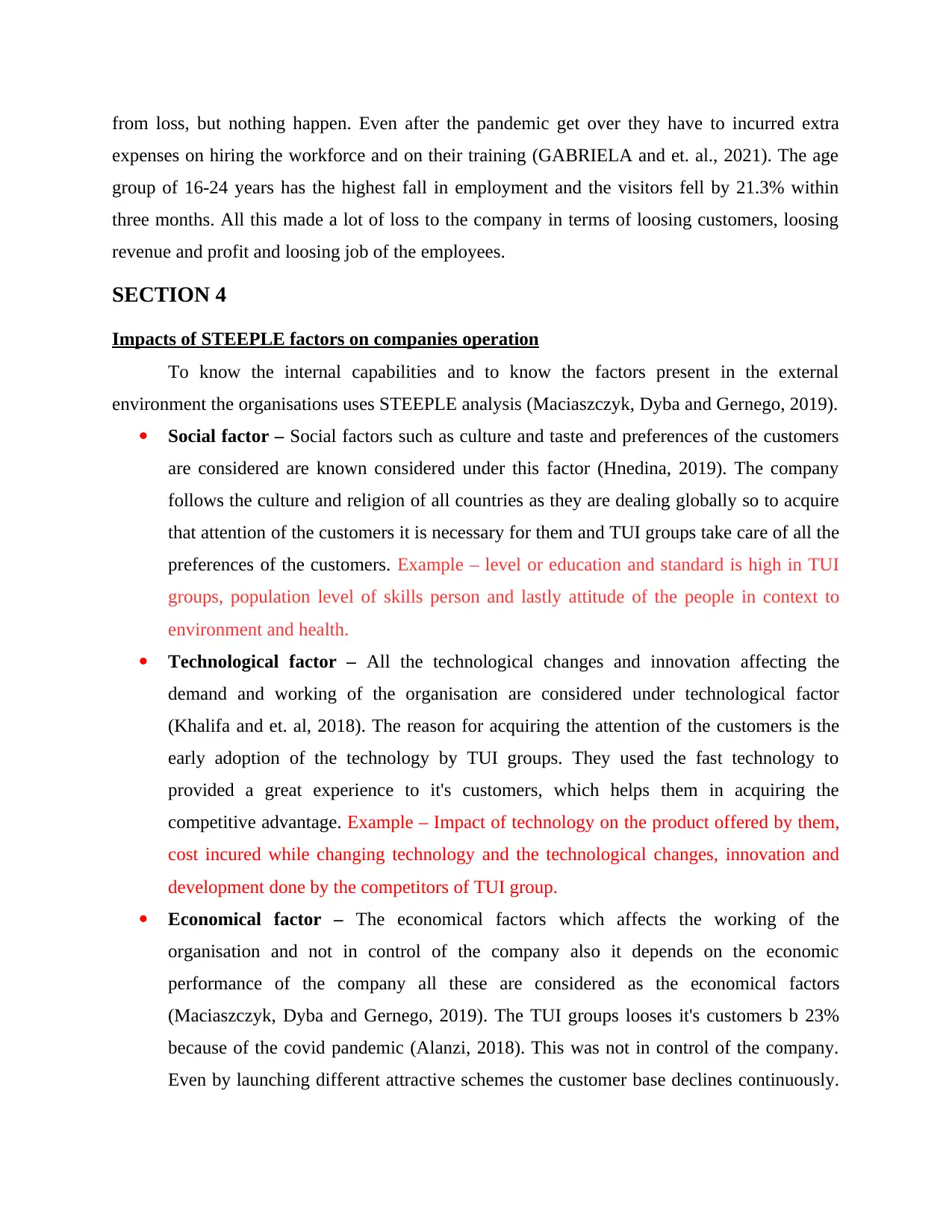
from loss, but nothing happen. Even after the pandemic get over they have to incurred extra
expenses on hiring the workforce and on their training (GABRIELA and et. al., 2021). The age
group of 16-24 years has the highest fall in employment and the visitors fell by 21.3% within
three months. All this made a lot of loss to the company in terms of loosing customers, loosing
revenue and profit and loosing job of the employees.
SECTION 4
Impacts of STEEPLE factors on companies operation
To know the internal capabilities and to know the factors present in the external
environment the organisations uses STEEPLE analysis (Maciaszczyk, Dyba and Gernego, 2019).
Social factor – Social factors such as culture and taste and preferences of the customers
are considered are known considered under this factor (Hnedina, 2019). The company
follows the culture and religion of all countries as they are dealing globally so to acquire
that attention of the customers it is necessary for them and TUI groups take care of all the
preferences of the customers. Example – level or education and standard is high in TUI
groups, population level of skills person and lastly attitude of the people in context to
environment and health.
Technological factor – All the technological changes and innovation affecting the
demand and working of the organisation are considered under technological factor
(Khalifa and et. al, 2018). The reason for acquiring the attention of the customers is the
early adoption of the technology by TUI groups. They used the fast technology to
provided a great experience to it's customers, which helps them in acquiring the
competitive advantage. Example – Impact of technology on the product offered by them,
cost incured while changing technology and the technological changes, innovation and
development done by the competitors of TUI group.
Economical factor – The economical factors which affects the working of the
organisation and not in control of the company also it depends on the economic
performance of the company all these are considered as the economical factors
(Maciaszczyk, Dyba and Gernego, 2019). The TUI groups looses it's customers b 23%
because of the covid pandemic (Alanzi, 2018). This was not in control of the company.
Even by launching different attractive schemes the customer base declines continuously.
expenses on hiring the workforce and on their training (GABRIELA and et. al., 2021). The age
group of 16-24 years has the highest fall in employment and the visitors fell by 21.3% within
three months. All this made a lot of loss to the company in terms of loosing customers, loosing
revenue and profit and loosing job of the employees.
SECTION 4
Impacts of STEEPLE factors on companies operation
To know the internal capabilities and to know the factors present in the external
environment the organisations uses STEEPLE analysis (Maciaszczyk, Dyba and Gernego, 2019).
Social factor – Social factors such as culture and taste and preferences of the customers
are considered are known considered under this factor (Hnedina, 2019). The company
follows the culture and religion of all countries as they are dealing globally so to acquire
that attention of the customers it is necessary for them and TUI groups take care of all the
preferences of the customers. Example – level or education and standard is high in TUI
groups, population level of skills person and lastly attitude of the people in context to
environment and health.
Technological factor – All the technological changes and innovation affecting the
demand and working of the organisation are considered under technological factor
(Khalifa and et. al, 2018). The reason for acquiring the attention of the customers is the
early adoption of the technology by TUI groups. They used the fast technology to
provided a great experience to it's customers, which helps them in acquiring the
competitive advantage. Example – Impact of technology on the product offered by them,
cost incured while changing technology and the technological changes, innovation and
development done by the competitors of TUI group.
Economical factor – The economical factors which affects the working of the
organisation and not in control of the company also it depends on the economic
performance of the company all these are considered as the economical factors
(Maciaszczyk, Dyba and Gernego, 2019). The TUI groups looses it's customers b 23%
because of the covid pandemic (Alanzi, 2018). This was not in control of the company.
Even by launching different attractive schemes the customer base declines continuously.
⊘ This is a preview!⊘
Do you want full access?
Subscribe today to unlock all pages.

Trusted by 1+ million students worldwide
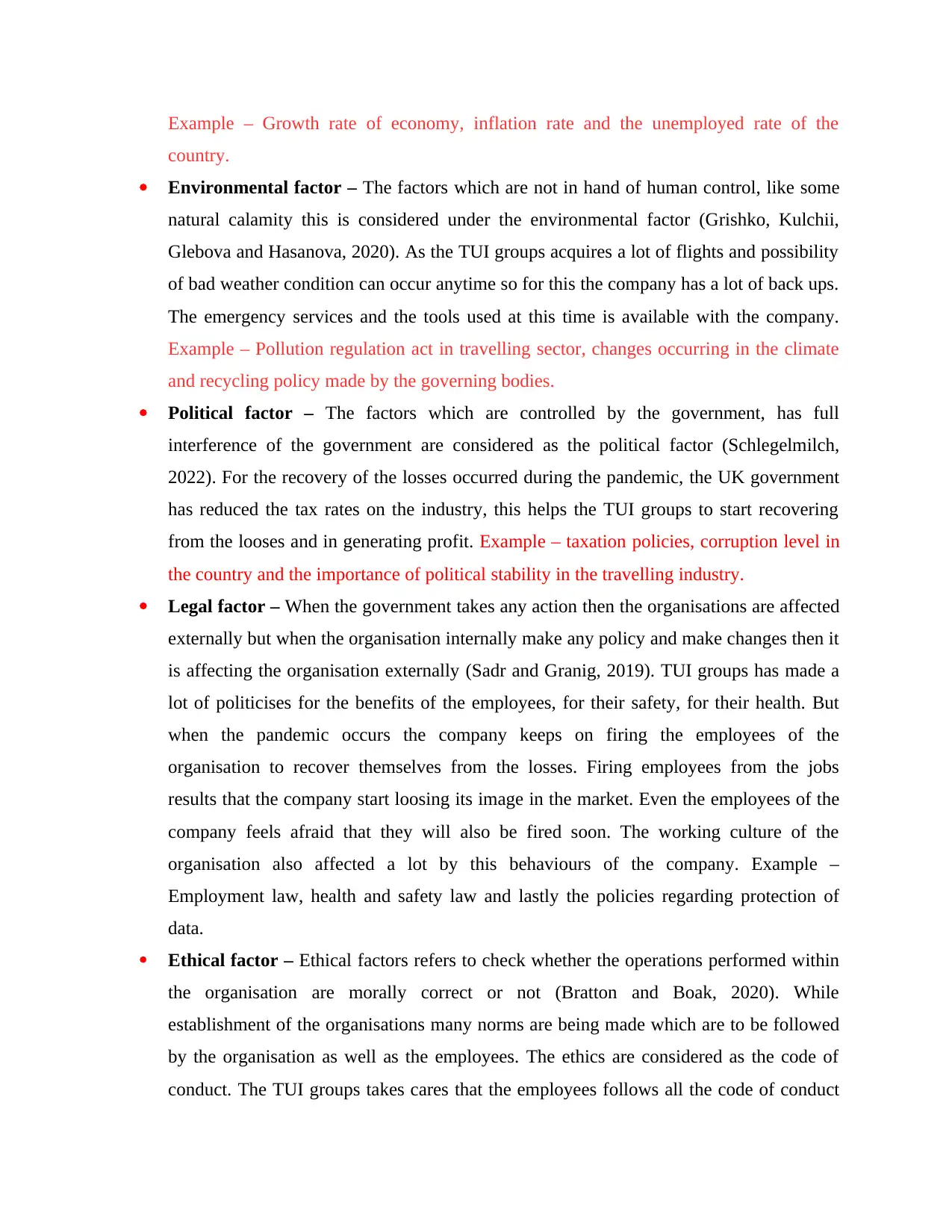
Example – Growth rate of economy, inflation rate and the unemployed rate of the
country.
Environmental factor – The factors which are not in hand of human control, like some
natural calamity this is considered under the environmental factor (Grishko, Kulchii,
Glebova and Hasanova, 2020). As the TUI groups acquires a lot of flights and possibility
of bad weather condition can occur anytime so for this the company has a lot of back ups.
The emergency services and the tools used at this time is available with the company.
Example – Pollution regulation act in travelling sector, changes occurring in the climate
and recycling policy made by the governing bodies.
Political factor – The factors which are controlled by the government, has full
interference of the government are considered as the political factor (Schlegelmilch,
2022). For the recovery of the losses occurred during the pandemic, the UK government
has reduced the tax rates on the industry, this helps the TUI groups to start recovering
from the looses and in generating profit. Example – taxation policies, corruption level in
the country and the importance of political stability in the travelling industry.
Legal factor – When the government takes any action then the organisations are affected
externally but when the organisation internally make any policy and make changes then it
is affecting the organisation externally (Sadr and Granig, 2019). TUI groups has made a
lot of politicises for the benefits of the employees, for their safety, for their health. But
when the pandemic occurs the company keeps on firing the employees of the
organisation to recover themselves from the losses. Firing employees from the jobs
results that the company start loosing its image in the market. Even the employees of the
company feels afraid that they will also be fired soon. The working culture of the
organisation also affected a lot by this behaviours of the company. Example –
Employment law, health and safety law and lastly the policies regarding protection of
data.
Ethical factor – Ethical factors refers to check whether the operations performed within
the organisation are morally correct or not (Bratton and Boak, 2020). While
establishment of the organisations many norms are being made which are to be followed
by the organisation as well as the employees. The ethics are considered as the code of
conduct. The TUI groups takes cares that the employees follows all the code of conduct
country.
Environmental factor – The factors which are not in hand of human control, like some
natural calamity this is considered under the environmental factor (Grishko, Kulchii,
Glebova and Hasanova, 2020). As the TUI groups acquires a lot of flights and possibility
of bad weather condition can occur anytime so for this the company has a lot of back ups.
The emergency services and the tools used at this time is available with the company.
Example – Pollution regulation act in travelling sector, changes occurring in the climate
and recycling policy made by the governing bodies.
Political factor – The factors which are controlled by the government, has full
interference of the government are considered as the political factor (Schlegelmilch,
2022). For the recovery of the losses occurred during the pandemic, the UK government
has reduced the tax rates on the industry, this helps the TUI groups to start recovering
from the looses and in generating profit. Example – taxation policies, corruption level in
the country and the importance of political stability in the travelling industry.
Legal factor – When the government takes any action then the organisations are affected
externally but when the organisation internally make any policy and make changes then it
is affecting the organisation externally (Sadr and Granig, 2019). TUI groups has made a
lot of politicises for the benefits of the employees, for their safety, for their health. But
when the pandemic occurs the company keeps on firing the employees of the
organisation to recover themselves from the losses. Firing employees from the jobs
results that the company start loosing its image in the market. Even the employees of the
company feels afraid that they will also be fired soon. The working culture of the
organisation also affected a lot by this behaviours of the company. Example –
Employment law, health and safety law and lastly the policies regarding protection of
data.
Ethical factor – Ethical factors refers to check whether the operations performed within
the organisation are morally correct or not (Bratton and Boak, 2020). While
establishment of the organisations many norms are being made which are to be followed
by the organisation as well as the employees. The ethics are considered as the code of
conduct. The TUI groups takes cares that the employees follows all the code of conduct
Paraphrase This Document
Need a fresh take? Get an instant paraphrase of this document with our AI Paraphraser
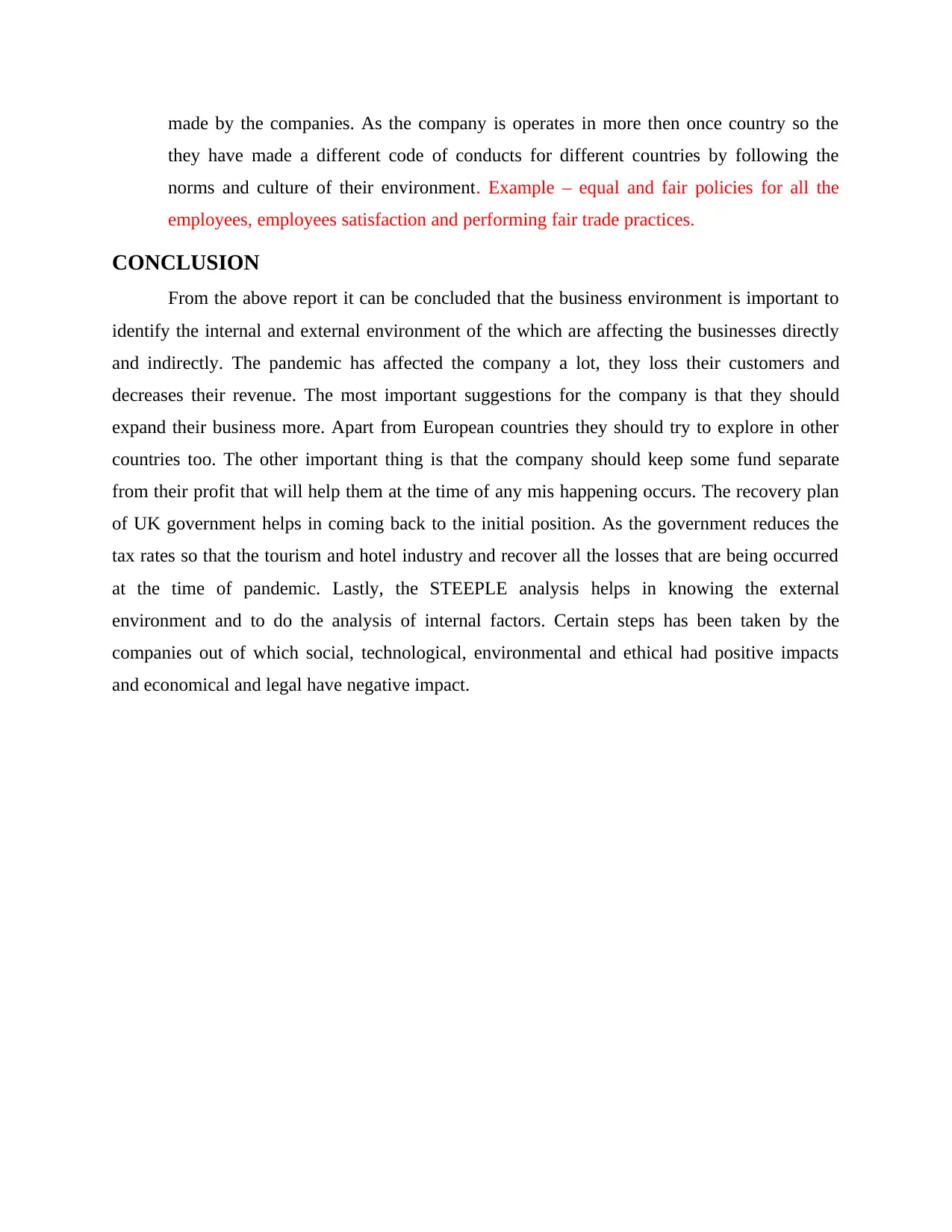
made by the companies. As the company is operates in more then once country so the
they have made a different code of conducts for different countries by following the
norms and culture of their environment. Example – equal and fair policies for all the
employees, employees satisfaction and performing fair trade practices.
CONCLUSION
From the above report it can be concluded that the business environment is important to
identify the internal and external environment of the which are affecting the businesses directly
and indirectly. The pandemic has affected the company a lot, they loss their customers and
decreases their revenue. The most important suggestions for the company is that they should
expand their business more. Apart from European countries they should try to explore in other
countries too. The other important thing is that the company should keep some fund separate
from their profit that will help them at the time of any mis happening occurs. The recovery plan
of UK government helps in coming back to the initial position. As the government reduces the
tax rates so that the tourism and hotel industry and recover all the losses that are being occurred
at the time of pandemic. Lastly, the STEEPLE analysis helps in knowing the external
environment and to do the analysis of internal factors. Certain steps has been taken by the
companies out of which social, technological, environmental and ethical had positive impacts
and economical and legal have negative impact.
they have made a different code of conducts for different countries by following the
norms and culture of their environment. Example – equal and fair policies for all the
employees, employees satisfaction and performing fair trade practices.
CONCLUSION
From the above report it can be concluded that the business environment is important to
identify the internal and external environment of the which are affecting the businesses directly
and indirectly. The pandemic has affected the company a lot, they loss their customers and
decreases their revenue. The most important suggestions for the company is that they should
expand their business more. Apart from European countries they should try to explore in other
countries too. The other important thing is that the company should keep some fund separate
from their profit that will help them at the time of any mis happening occurs. The recovery plan
of UK government helps in coming back to the initial position. As the government reduces the
tax rates so that the tourism and hotel industry and recover all the losses that are being occurred
at the time of pandemic. Lastly, the STEEPLE analysis helps in knowing the external
environment and to do the analysis of internal factors. Certain steps has been taken by the
companies out of which social, technological, environmental and ethical had positive impacts
and economical and legal have negative impact.
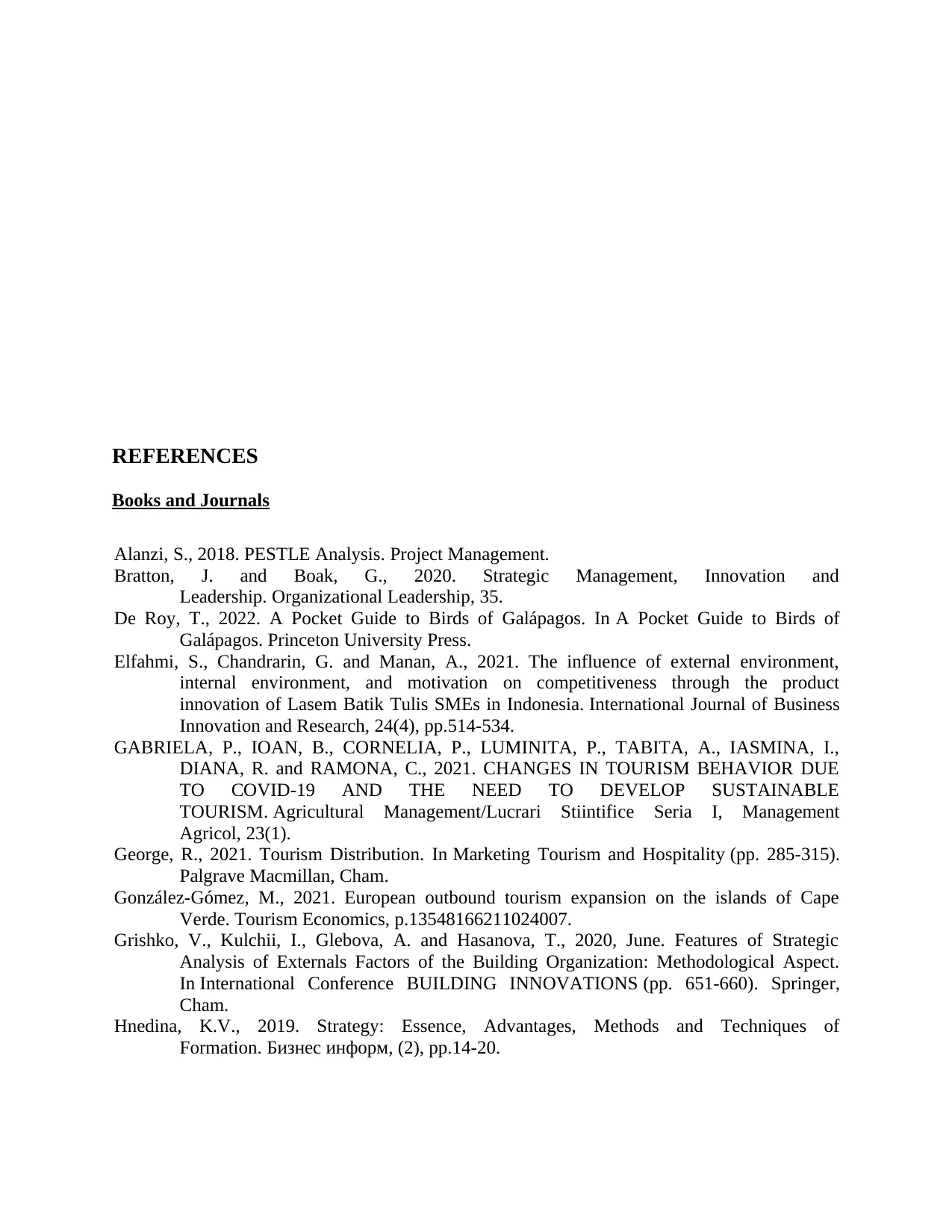
REFERENCES
Books and Journals
Alanzi, S., 2018. PESTLE Analysis. Project Management.
Bratton, J. and Boak, G., 2020. Strategic Management, Innovation and
Leadership. Organizational Leadership, 35.
De Roy, T., 2022. A Pocket Guide to Birds of Galápagos. In A Pocket Guide to Birds of
Galápagos. Princeton University Press.
Elfahmi, S., Chandrarin, G. and Manan, A., 2021. The influence of external environment,
internal environment, and motivation on competitiveness through the product
innovation of Lasem Batik Tulis SMEs in Indonesia. International Journal of Business
Innovation and Research, 24(4), pp.514-534.
GABRIELA, P., IOAN, B., CORNELIA, P., LUMINITA, P., TABITA, A., IASMINA, I.,
DIANA, R. and RAMONA, C., 2021. CHANGES IN TOURISM BEHAVIOR DUE
TO COVID-19 AND THE NEED TO DEVELOP SUSTAINABLE
TOURISM. Agricultural Management/Lucrari Stiintifice Seria I, Management
Agricol, 23(1).
George, R., 2021. Tourism Distribution. In Marketing Tourism and Hospitality (pp. 285-315).
Palgrave Macmillan, Cham.
González-Gómez, M., 2021. European outbound tourism expansion on the islands of Cape
Verde. Tourism Economics, p.13548166211024007.
Grishko, V., Kulchii, I., Glebova, A. and Hasanova, T., 2020, June. Features of Strategic
Analysis of Externals Factors of the Building Organization: Methodological Aspect.
In International Conference BUILDING INNOVATIONS (pp. 651-660). Springer,
Cham.
Hnedina, K.V., 2019. Strategy: Essence, Advantages, Methods and Techniques of
Formation. Бизнес информ, (2), pp.14-20.
Books and Journals
Alanzi, S., 2018. PESTLE Analysis. Project Management.
Bratton, J. and Boak, G., 2020. Strategic Management, Innovation and
Leadership. Organizational Leadership, 35.
De Roy, T., 2022. A Pocket Guide to Birds of Galápagos. In A Pocket Guide to Birds of
Galápagos. Princeton University Press.
Elfahmi, S., Chandrarin, G. and Manan, A., 2021. The influence of external environment,
internal environment, and motivation on competitiveness through the product
innovation of Lasem Batik Tulis SMEs in Indonesia. International Journal of Business
Innovation and Research, 24(4), pp.514-534.
GABRIELA, P., IOAN, B., CORNELIA, P., LUMINITA, P., TABITA, A., IASMINA, I.,
DIANA, R. and RAMONA, C., 2021. CHANGES IN TOURISM BEHAVIOR DUE
TO COVID-19 AND THE NEED TO DEVELOP SUSTAINABLE
TOURISM. Agricultural Management/Lucrari Stiintifice Seria I, Management
Agricol, 23(1).
George, R., 2021. Tourism Distribution. In Marketing Tourism and Hospitality (pp. 285-315).
Palgrave Macmillan, Cham.
González-Gómez, M., 2021. European outbound tourism expansion on the islands of Cape
Verde. Tourism Economics, p.13548166211024007.
Grishko, V., Kulchii, I., Glebova, A. and Hasanova, T., 2020, June. Features of Strategic
Analysis of Externals Factors of the Building Organization: Methodological Aspect.
In International Conference BUILDING INNOVATIONS (pp. 651-660). Springer,
Cham.
Hnedina, K.V., 2019. Strategy: Essence, Advantages, Methods and Techniques of
Formation. Бизнес информ, (2), pp.14-20.
⊘ This is a preview!⊘
Do you want full access?
Subscribe today to unlock all pages.

Trusted by 1+ million students worldwide
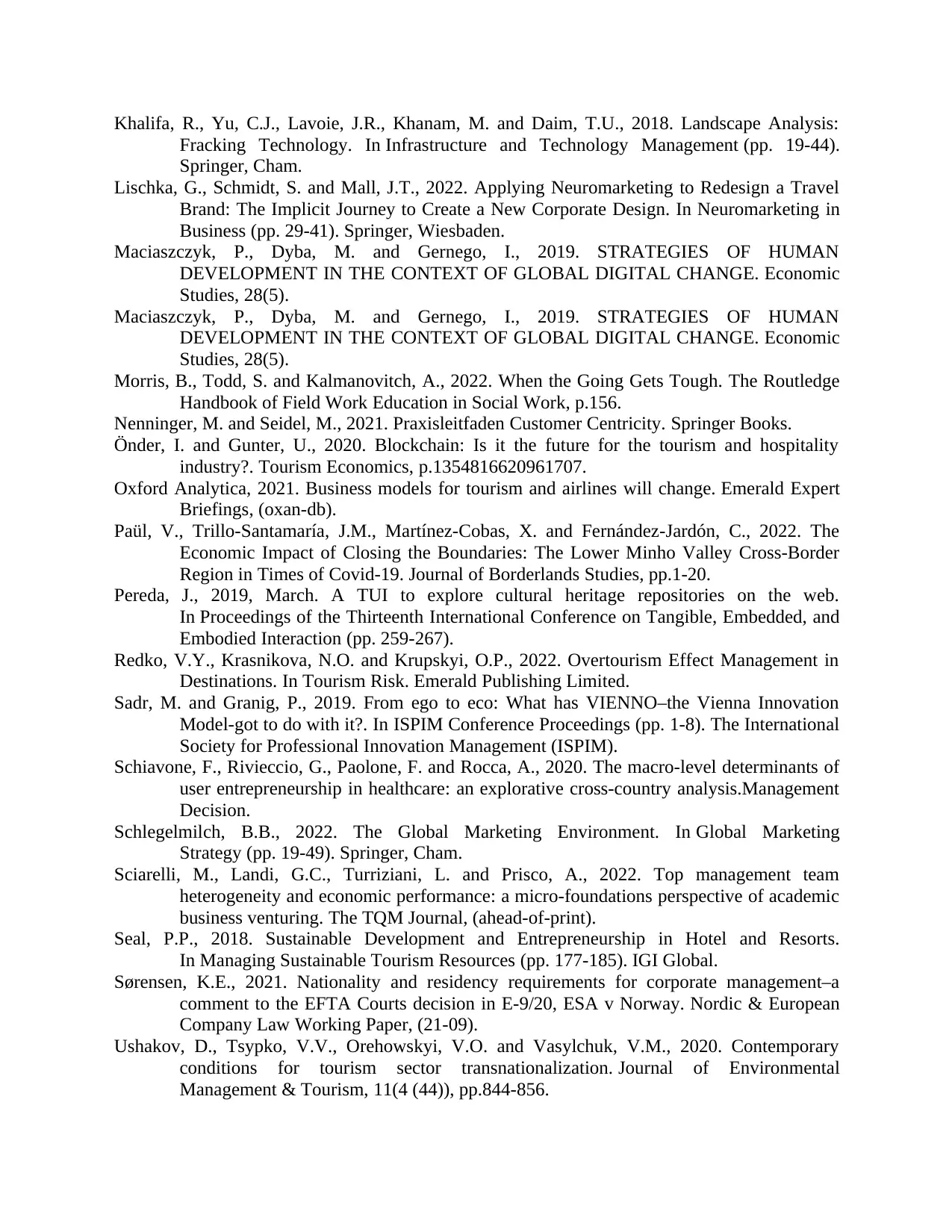
Khalifa, R., Yu, C.J., Lavoie, J.R., Khanam, M. and Daim, T.U., 2018. Landscape Analysis:
Fracking Technology. In Infrastructure and Technology Management (pp. 19-44).
Springer, Cham.
Lischka, G., Schmidt, S. and Mall, J.T., 2022. Applying Neuromarketing to Redesign a Travel
Brand: The Implicit Journey to Create a New Corporate Design. In Neuromarketing in
Business (pp. 29-41). Springer, Wiesbaden.
Maciaszczyk, P., Dyba, M. and Gernego, I., 2019. STRATEGIES OF HUMAN
DEVELOPMENT IN THE CONTEXT OF GLOBAL DIGITAL CHANGE. Economic
Studies, 28(5).
Maciaszczyk, P., Dyba, M. and Gernego, I., 2019. STRATEGIES OF HUMAN
DEVELOPMENT IN THE CONTEXT OF GLOBAL DIGITAL CHANGE. Economic
Studies, 28(5).
Morris, B., Todd, S. and Kalmanovitch, A., 2022. When the Going Gets Tough. The Routledge
Handbook of Field Work Education in Social Work, p.156.
Nenninger, M. and Seidel, M., 2021. Praxisleitfaden Customer Centricity. Springer Books.
Önder, I. and Gunter, U., 2020. Blockchain: Is it the future for the tourism and hospitality
industry?. Tourism Economics, p.1354816620961707.
Oxford Analytica, 2021. Business models for tourism and airlines will change. Emerald Expert
Briefings, (oxan-db).
Paül, V., Trillo-Santamaría, J.M., Martínez-Cobas, X. and Fernández-Jardón, C., 2022. The
Economic Impact of Closing the Boundaries: The Lower Minho Valley Cross-Border
Region in Times of Covid-19. Journal of Borderlands Studies, pp.1-20.
Pereda, J., 2019, March. A TUI to explore cultural heritage repositories on the web.
In Proceedings of the Thirteenth International Conference on Tangible, Embedded, and
Embodied Interaction (pp. 259-267).
Redko, V.Y., Krasnikova, N.O. and Krupskyi, O.P., 2022. Overtourism Effect Management in
Destinations. In Tourism Risk. Emerald Publishing Limited.
Sadr, M. and Granig, P., 2019. From ego to eco: What has VIENNO–the Vienna Innovation
Model-got to do with it?. In ISPIM Conference Proceedings (pp. 1-8). The International
Society for Professional Innovation Management (ISPIM).
Schiavone, F., Rivieccio, G., Paolone, F. and Rocca, A., 2020. The macro-level determinants of
user entrepreneurship in healthcare: an explorative cross-country analysis.Management
Decision.
Schlegelmilch, B.B., 2022. The Global Marketing Environment. In Global Marketing
Strategy (pp. 19-49). Springer, Cham.
Sciarelli, M., Landi, G.C., Turriziani, L. and Prisco, A., 2022. Top management team
heterogeneity and economic performance: a micro-foundations perspective of academic
business venturing. The TQM Journal, (ahead-of-print).
Seal, P.P., 2018. Sustainable Development and Entrepreneurship in Hotel and Resorts.
In Managing Sustainable Tourism Resources (pp. 177-185). IGI Global.
Sørensen, K.E., 2021. Nationality and residency requirements for corporate management–a
comment to the EFTA Courts decision in E-9/20, ESA v Norway. Nordic & European
Company Law Working Paper, (21-09).
Ushakov, D., Tsypko, V.V., Orehowskyi, V.O. and Vasylchuk, V.M., 2020. Contemporary
conditions for tourism sector transnationalization. Journal of Environmental
Management & Tourism, 11(4 (44)), pp.844-856.
Fracking Technology. In Infrastructure and Technology Management (pp. 19-44).
Springer, Cham.
Lischka, G., Schmidt, S. and Mall, J.T., 2022. Applying Neuromarketing to Redesign a Travel
Brand: The Implicit Journey to Create a New Corporate Design. In Neuromarketing in
Business (pp. 29-41). Springer, Wiesbaden.
Maciaszczyk, P., Dyba, M. and Gernego, I., 2019. STRATEGIES OF HUMAN
DEVELOPMENT IN THE CONTEXT OF GLOBAL DIGITAL CHANGE. Economic
Studies, 28(5).
Maciaszczyk, P., Dyba, M. and Gernego, I., 2019. STRATEGIES OF HUMAN
DEVELOPMENT IN THE CONTEXT OF GLOBAL DIGITAL CHANGE. Economic
Studies, 28(5).
Morris, B., Todd, S. and Kalmanovitch, A., 2022. When the Going Gets Tough. The Routledge
Handbook of Field Work Education in Social Work, p.156.
Nenninger, M. and Seidel, M., 2021. Praxisleitfaden Customer Centricity. Springer Books.
Önder, I. and Gunter, U., 2020. Blockchain: Is it the future for the tourism and hospitality
industry?. Tourism Economics, p.1354816620961707.
Oxford Analytica, 2021. Business models for tourism and airlines will change. Emerald Expert
Briefings, (oxan-db).
Paül, V., Trillo-Santamaría, J.M., Martínez-Cobas, X. and Fernández-Jardón, C., 2022. The
Economic Impact of Closing the Boundaries: The Lower Minho Valley Cross-Border
Region in Times of Covid-19. Journal of Borderlands Studies, pp.1-20.
Pereda, J., 2019, March. A TUI to explore cultural heritage repositories on the web.
In Proceedings of the Thirteenth International Conference on Tangible, Embedded, and
Embodied Interaction (pp. 259-267).
Redko, V.Y., Krasnikova, N.O. and Krupskyi, O.P., 2022. Overtourism Effect Management in
Destinations. In Tourism Risk. Emerald Publishing Limited.
Sadr, M. and Granig, P., 2019. From ego to eco: What has VIENNO–the Vienna Innovation
Model-got to do with it?. In ISPIM Conference Proceedings (pp. 1-8). The International
Society for Professional Innovation Management (ISPIM).
Schiavone, F., Rivieccio, G., Paolone, F. and Rocca, A., 2020. The macro-level determinants of
user entrepreneurship in healthcare: an explorative cross-country analysis.Management
Decision.
Schlegelmilch, B.B., 2022. The Global Marketing Environment. In Global Marketing
Strategy (pp. 19-49). Springer, Cham.
Sciarelli, M., Landi, G.C., Turriziani, L. and Prisco, A., 2022. Top management team
heterogeneity and economic performance: a micro-foundations perspective of academic
business venturing. The TQM Journal, (ahead-of-print).
Seal, P.P., 2018. Sustainable Development and Entrepreneurship in Hotel and Resorts.
In Managing Sustainable Tourism Resources (pp. 177-185). IGI Global.
Sørensen, K.E., 2021. Nationality and residency requirements for corporate management–a
comment to the EFTA Courts decision in E-9/20, ESA v Norway. Nordic & European
Company Law Working Paper, (21-09).
Ushakov, D., Tsypko, V.V., Orehowskyi, V.O. and Vasylchuk, V.M., 2020. Contemporary
conditions for tourism sector transnationalization. Journal of Environmental
Management & Tourism, 11(4 (44)), pp.844-856.
Paraphrase This Document
Need a fresh take? Get an instant paraphrase of this document with our AI Paraphraser
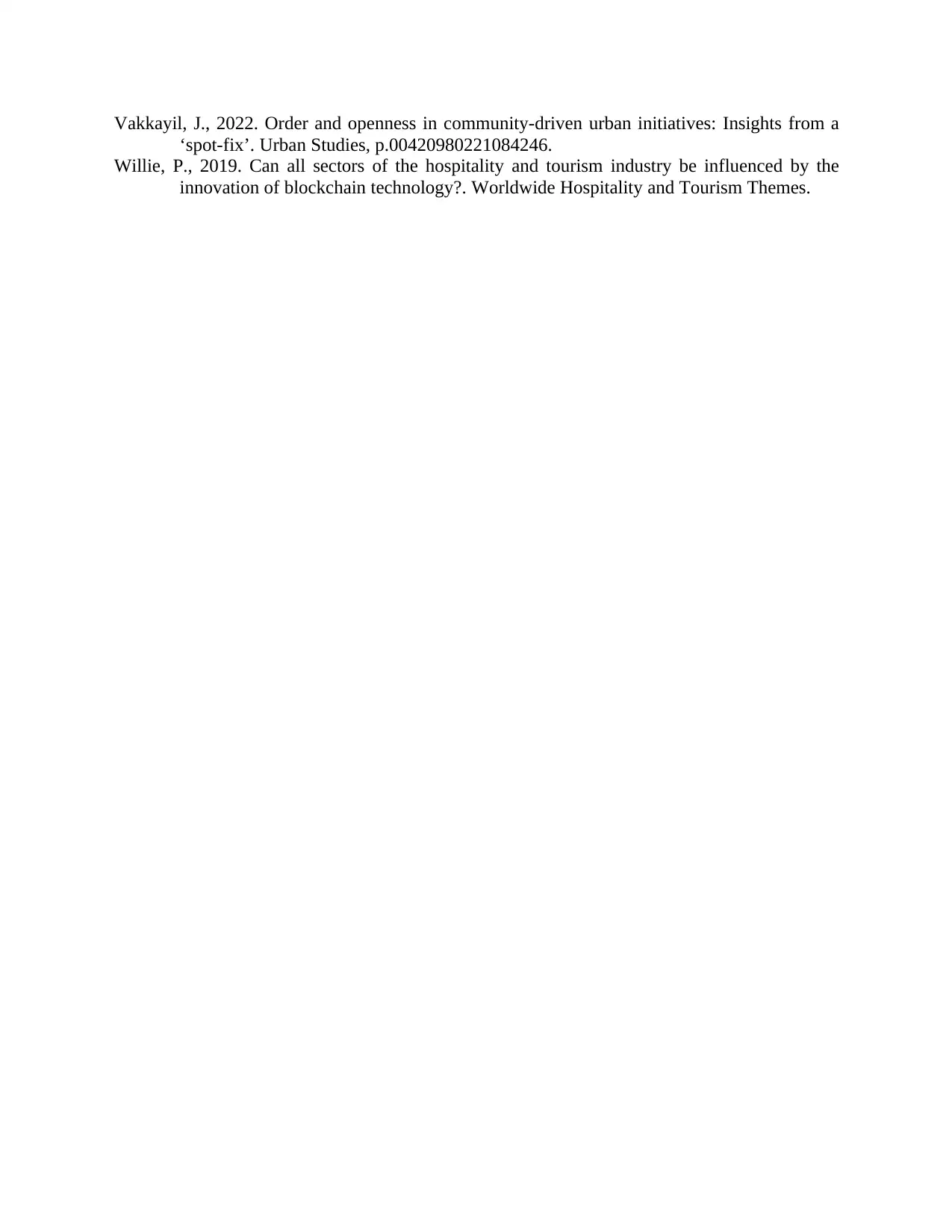
Vakkayil, J., 2022. Order and openness in community-driven urban initiatives: Insights from a
‘spot-fix’. Urban Studies, p.00420980221084246.
Willie, P., 2019. Can all sectors of the hospitality and tourism industry be influenced by the
innovation of blockchain technology?. Worldwide Hospitality and Tourism Themes.
‘spot-fix’. Urban Studies, p.00420980221084246.
Willie, P., 2019. Can all sectors of the hospitality and tourism industry be influenced by the
innovation of blockchain technology?. Worldwide Hospitality and Tourism Themes.
1 out of 11
Related Documents
Your All-in-One AI-Powered Toolkit for Academic Success.
+13062052269
info@desklib.com
Available 24*7 on WhatsApp / Email
![[object Object]](/_next/static/media/star-bottom.7253800d.svg)
Unlock your academic potential
Copyright © 2020–2026 A2Z Services. All Rights Reserved. Developed and managed by ZUCOL.



